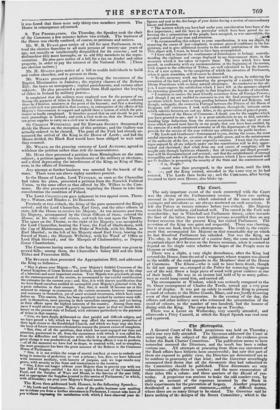etbe Court.
The only important event of the week connected with the Court was the closing of the Parliamentary session. There was nothing
unusual in the procession ; which consisted of the same number of carriages and attendants as are always mustered on such occasions. It left the Palace at twenty minutes before two o'clock. His Majesty wore his Naval uniform, and looked well. The crowd in the Park was considerable; but in Whitehall and Parliament Street, unless towards the foot of the latter, there were fewer persons assembled than on any former occasion that the present King has visited Parliament. The rcoention of the King was quiet and respectful. There was cheering, but it was not loud, much less obstreperous. The truth is, the excite- ment that accompanied his Majesty on that remarkable day on which he last dissolved Parliament has subsided. Nor was the King, on Thursday, in the performance of a routine duty, the same marked and important object that be was on the former occasion, when it seemed to depend on his single voice whether the hopes of the People were to blossom or wither.
There was a slight, a very slight disturbance, after the King had entered the House, from the act of a waggoner, whose waggon was placed in the middle of the road opposite to the Members' door of the House of Commons. The fellow—who is said to have been drunk, though lie did not appear so7-enraged at the Police for removing the waggon out of the way, threw a large piece of wood with great violence at one of their heads. He was in an instant laid hold of by as many police- men as could hang round him, and carried off.
The encampment at Windsor, which was seriously compared to the St. Omer encampment of Charles the Tenth, turned out a very poor piece of display. It was got up solely to enable the King to present a stand of colours to the Horse Guards, Blues, and was hardly deserving even of that insignificant occasion. In the evening of the day, the officers and other military men who witnessed the presentation of the stand of colours, to the number of two hundred, had the honour of dining with the King. The camp broke up on Tuesday. There was a- Levee on Wednesday, very scantily attended; and afterwards a Privy Council, at which the Royal Speech was read over and approved.


























 Previous page
Previous page